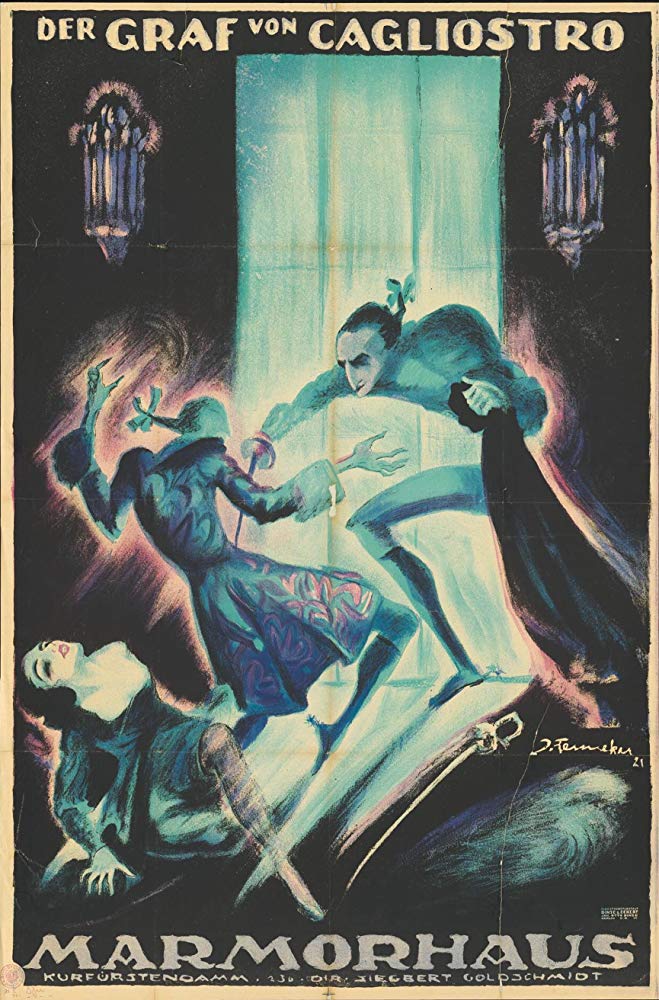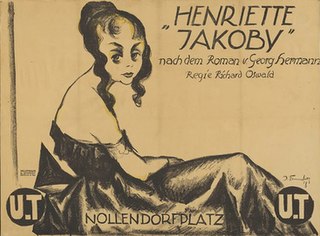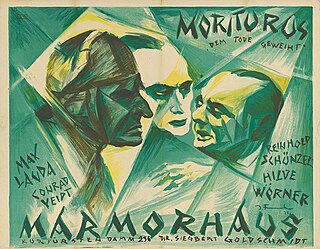
Hans Walter Conrad Veidt was a German actor. He attracted early attention for his roles in the films Different from the Others (1919), The Cabinet of Dr. Caligari (1920), and The Man Who Laughs (1928). After a successful career in German silent films, where he was one of the best-paid stars of UFA, Veidt and his new Jewish wife Ilona Prager left Germany in 1933 after the Nazis came to power. The couple settled in Britain, where he took citizenship in 1939. He appeared in many British films, including The Thief of Bagdad (1940), before emigrating to the United States around 1941, which led to his being cast in what may be his best remembered role as Major Strasser in Casablanca (1942). This was Veidt's last film role to be released during his lifetime.

Lady Hamilton is a 1921 German silent historical film directed by Richard Oswald and starring Liane Haid, Conrad Veidt and Werner Krauss. The film depicts the love affair between the British Admiral Lord Nelson and Lady Emma Hamilton. It was based on two novels by Heinrich Vollrath Schumacher. A copy of the film exists in a Russian film archive.
Storm over Asia is a 1938 French drama film directed by Richard Oswald and starring Conrad Veidt, Sessue Hayakawa and Madeleine Robinson.

William Tell is a 1934 German-Swiss historical drama film directed by Heinz Paul and starring Hans Marr, Conrad Veidt and Emmy Göring. It is based on the 1804 play William Tell by Friedrich Schiller about the Swiss folk hero William Tell. It was made in Germany by Terra Film, with a separate English-language version supervised by Manning Haynes also being released. It was shot at the Marienfelde Studios of Terra Film in Berlin with location shooting in Switzerland. While working on the film Veidt, who had recently given sympathetic performances of Jews in Jew Suss (1934) and The Wandering Jew, was detained by the authorities. It was only after pressure from the British Foreign Office that he was eventually released. It is also known by the alternative title The Legend of William Tell.

Should We Be Silent? is a 1926 German silent drama film directed by Richard Oswald and starring Conrad Veidt, Walter Rilla and Henri De Vries. It was made at the Johannisthal Studios in Berlin. The film's art direction was by Heinrich Richter-Berlin. The film exists only in fragmentary form.

Der Graf von Cagliostro is a 1920 silent film directed and co-written by Reinhold Schünzel and starring Schünzel, Anita Berber and Conrad Veidt. It depicts the life of the eighteenth century Italian mesmerist and occultist Alessandro Cagliostro, who called himself Cagliostro. The film is considered a lost film.
The Flight in the Night is a 1926 German silent film directed by Amleto Palermi and starring Conrad Veidt, Robert Scholz and Angelo Ferrari. It was based on the play Henry IV by Luigi Pirandello. The art direction was by Hermann Warm. It was shot on location in Italy.

Henriette Jacoby is a 1918 German silent film directed by Richard Oswald and starring Mechthildis Thein, Conrad Veidt and Leo Connard. It is the sequel to Jettchen Gebert's Story. It is a lost film.
Peer Gynt is a 1919 German silent film directed by Victor Barnowsky and Richard Oswald and starring Heinz Salfner, Ilka Grüning and Lina Lossen. It is based upon the play by Henrik Ibsen.
Christian Wahnschaffe is a 1920 German silent drama film directed by Urban Gad and starring Conrad Veidt, Lillebil Ibsen, and Fritz Kortner. It was released in two parts World Ablaze (Weltbrand) in November 1920 and The Escape from the Golden Prison in March 1921. It is an adaptation of the novel of the same title by Jakob Wassermann. The film is extant, and was restored in 2018 by the Friedrich-Wilhelm-Murnau-Stiftung.
Kurfürstendamm is a 1920 German silent drama film directed by Richard Oswald and starring Conrad Veidt, Asta Nielsen, and Erna Morena. It is set on the Kurfürstendamm in central Berlin. It is now considered a lost film.
Patience or The Cards of Death is a 1920 German silent film directed by Felix Basch and Paul Leni and starring Conrad Veidt, Adele Sandrock, and Wilhelm Diegelmann. It was produced by Gloria-Film, a company later taken over by UFA.

Prince Cuckoo is a 1919 German silent drama film directed by Paul Leni and starring Conrad Veidt, Olga Limburg, and Magnus Stifter. It premiered at the Marmorhaus. It is now considered a lost film.
The Japanese Woman is a 1919 German silent mystery film directed by Ewald André Dupont and starring Max Landa, Manja Tzatschewa and Conrad Veidt.
People in Ecstasy is a 1921 German silent film directed by Julius Geisendörfer and starring Conrad Veidt.

Colomba is a 1918 German silent drama film directed by Arzén von Cserépy and starring Erna Morena, Werner Krauss and Conrad Veidt. It is now considered a lost film.

The Path of Death is a 1917 German silent drama film directed by Robert Reinert and starring Maria Carmi, Carl de Vogt and Conrad Veidt. It marked the screen debut of Veidt. The film was shot in late 1916, but released the following year. It is a lost film.

Moriturus is a 1920 German silent crime film directed by Carl Hagen and starring Max Landa, Reinhold Schünzel and Conrad Veidt. It premiered at the Marmorhaus in Berlin.
Gold and Luck is a 1923 German silent film directed by Adolf Trotz and starring Conrad Veidt, Erna Morena and Eduard von Winterstein. An independent production by the Hamburg-based Mercator-Film, it is now considered a lost film.
Country Roads and the Big City is a 1921 German silent film directed by Carl Wilhelm and starring Carola Toelle, Fritz Kortner and Conrad Veidt.










